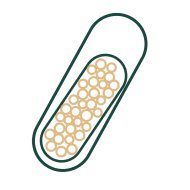
Do you have questions?
Need additional advice? No problem! Ask our team of experts. We'd love to hear from you.
Your cart
Made in Belgium
Your cart is empty
Continue shoppingFor free delivery
Only €45,00 left to unlock the free delivery
Order summary
You might also like
Smart movement. Every day. Discover the new J-Magneflex II Shot → Shop now
Iron is an important mineral that contributes to the formation of red blood cells, cell division, cognitive functions, and the immune system. It supports a normal energy-yielding metabolism and helps reduce fatigue. Iron is found in both animal and plant sources such as meat, fish, beans, and spinach. The body cannot produce iron itself, so obtaining enough from food is essential.

Iron is an essential mineral that contributes to many processes in our body. It is found in various foods and plays an indispensable role in maintaining our health.
Iron fulfills various functions in our body:
Iron is present in both animal and plant-based food sources. Examples include red meat, poultry, fish, lentils, beans, spinach, and iron-enriched cereals.
The daily iron requirement varies per person and depends on factors such as age, gender, and health condition. For example, the iron need of a menstruating woman is higher than that of a woman in menopause.
A balanced diet with sufficient iron-rich foods is key. Plant-based sources of iron are better absorbed when combined with foods rich in vitamin C, such as citrus fruits or bell peppers.
No, the body cannot produce iron. That’s why it’s important to obtain enough iron from your diet. A balanced diet can ensure adequate iron intake. Supplementation can also be beneficial, especially for menstruating women.
Oxygen is essential for the functioning of every cell in our body. Iron contributes to normal oxygen transport, meaning it helps carry oxygen from the lungs to all the body’s cells.
Iron contributes to normal cognitive function. This means the mineral is involved in processes such as thinking, learning, and memory.
Iron plays an important role in the normal functioning of the immune system. The immune system protects the body against pathogens and infections, and iron supports this process.
Iron plays an important role in the process of cell division. This is an essential process for growth, repair, and the normal functioning of our body.
There are two types of iron: heme iron and non-heme iron. Heme iron is found in animal products, such as meat and fish, and is better absorbed by the body. Non-heme iron, derived from plant-based sources like beans and leafy greens, is absorbed less efficiently.
Combining iron-rich foods with products high in vitamin C can help improve the absorption of non-heme iron.
Iron can indeed be taken in the form of a supplement. For example, the Smart Vitamins for Her by Insentials contain iron.

Need additional advice? No problem! Ask our team of experts. We'd love to hear from you.
+32 475 75 32 52